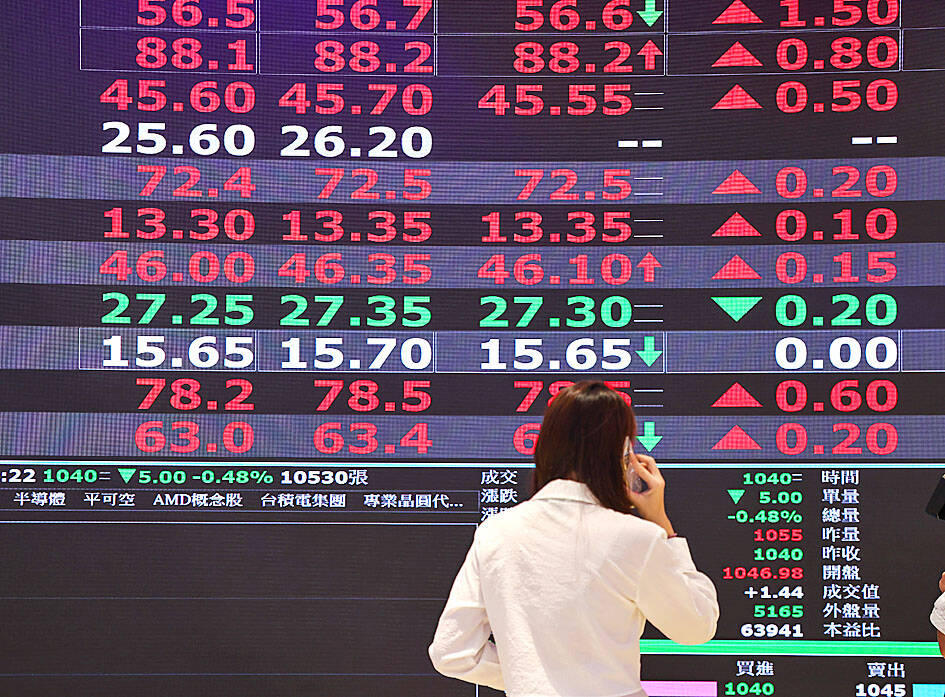The TAIEX yesterday staged a technical rebound after US President Donald Trump postponed tariffs on goods from Mexico and Canada for one month, but gains were capped ahead of 23,000 points, dealers said.
After falling 3.53 percent a session earlier, the TAIEX closed up 99.25 points, or 0.44 percent, at 22,793.96. Turnover totaled NT$408.99 billion (US$12.4 billion).
Led by the electronics sector, investors appeared relieved by Trump’s move to delay a 25 percent tariff on imports from Mexico and Canada for one month, dealers said.

Photo: CNA
However, with the TAIEX moving closer to 23,000 points, some investors shifted to the sell side, while contract chipmaker Taiwan Semiconductor Manufacturing Co (TSMC, 台積電) sustained most of its earlier gains to prevent the broader market from weakening, dealers added.
TSMC, the local market’s most heavily weighted stock, rose 2.34 percent to close at NT$1,095. Its gains represented about 200 points in the TAIEX’s rise.
“Today’s movement showed many investors stayed cautious about Trump’s policies,” Mega International Investment Services Corp (兆豐國際投顧) analyst Alex Huang (黃國偉) said. “Despite the postponement of the tariffs on Mexico and Canada, in the era of an unpredictable Trump, investors simply wanted to wait.”
Application-specific integrated circuit designer Alchip Technologies Ltd (世芯) soared 10 percent, the maximum daily increase, to close at NT$3,245 as the stock was named by some analysts as a beneficiary amid worry over Chinese artificial intelligence company DeepSeek (深度求索).
Also in the technology sector, iPhone assembler Hon Hai Precision Industry Co (鴻海精密) lost 0.3 percent to close at NT$165, and Quanta Computer Inc (廣達), another contract electronics maker, shed 3.29 percent to close at NT$235.
Many old economy stocks limited the upturn on the TAIEX, Huang said.
Among them, Chia Hsin Cement Corp (嘉新水泥) lost 2.03 percent to close at NT$16.85. Formosa Chemicals & Fibre Corp (台化) shed 3.79 percent to close at NT$26.65 and Formosa Petrochemical Corp (台塑石化) closed down 3.35 percent at NT$33.20.
“Market sentiment stayed cautious as investors kept alert over Trump’s threats of massive tariffs on chips,” Huang said. “Investors had better keep more cash on hand now.”
Despite the TAIEX’s rebound, foreign institutional investors yesterday sold a net NT$15.19 billion of shares on the main board, the Taiwan Stock Exchange Corp said.
Asian stock markets also advanced, although unease about the lack of movement on averting the Chinese tariffs saw traders’ pare some of the morning’s gains.
Hong Kong’s Hang Seng Index, which rose more than 3 percent in the morning, closed 2.83 percent higher at 20,789.96, with analysts saying the measures so far would not have a major impact on China’s economy.
Tokyo, Seoul, Manila, Sydney, Mumbai, Bangkok and Wellington also closed higher, while Sydney and Singapore edged down.
Japan’s Nikkei 225 closed 0.7 percent higher at 38,798.37.

Hon Hai Precision Industry Co (鴻海精密) yesterday said that its research institute has launched its first advanced artificial intelligence (AI) large language model (LLM) using traditional Chinese, with technology assistance from Nvidia Corp. Hon Hai, also known as Foxconn Technology Group (富士康科技集團), said the LLM, FoxBrain, is expected to improve its data analysis capabilities for smart manufacturing, and electric vehicle and smart city development. An LLM is a type of AI trained on vast amounts of text data and uses deep learning techniques, particularly neural networks, to process and generate language. They are essential for building and improving AI-powered servers. Nvidia provided assistance

GREAT SUCCESS: Republican Senator Todd Young expressed surprise at Trump’s comments and said he expects the administration to keep the program running US lawmakers who helped secure billions of dollars in subsidies for domestic semiconductor manufacturing rejected US President Donald Trump’s call to revoke the 2022 CHIPS and Science Act, signaling that any repeal effort in the US Congress would fall short. US Senate Minority Leader Chuck Schumer, who negotiated the law, on Wednesday said that Trump’s demand would fail, while a top Republican proponent, US Senator Todd Young, expressed surprise at the president’s comments and said he expects the administration to keep the program running. The CHIPS Act is “essential for America leading the world in tech, leading the world in AI [artificial

DOMESTIC SUPPLY: The probe comes as Donald Trump has called for the repeal of the US$52.7 billion CHIPS and Science Act, which the US Congress passed in 2022 The Office of the US Trade Representative is to hold a hearing tomorrow into older Chinese-made “legacy” semiconductors that could heap more US tariffs on chips from China that power everyday goods from cars to washing machines to telecoms equipment. The probe, which began during former US president Joe Biden’s tenure in December last year, aims to protect US and other semiconductor producers from China’s massive state-driven buildup of domestic chip supply. A 50 percent US tariff on Chinese semiconductors began on Jan. 1. Legacy chips use older manufacturing processes introduced more than a decade ago and are often far simpler than

Gasoline and diesel prices this week are to decrease NT$0.5 and NT$1 per liter respectively as international crude prices continued to fall last week, CPC Corp, Taiwan (CPC, 台灣中油) and Formosa Petrochemical Corp (台塑石化) said yesterday. Effective today, gasoline prices at CPC and Formosa stations are to decrease to NT$29.2, NT$30.7 and NT$32.7 per liter for 92, 95 and 98-octane unleaded gasoline respectively, while premium diesel is to cost NT$27.9 per liter at CPC stations and NT$27.7 at Formosa pumps, the companies said in separate statements. Global crude oil prices dropped last week after the eight OPEC+ members said they would